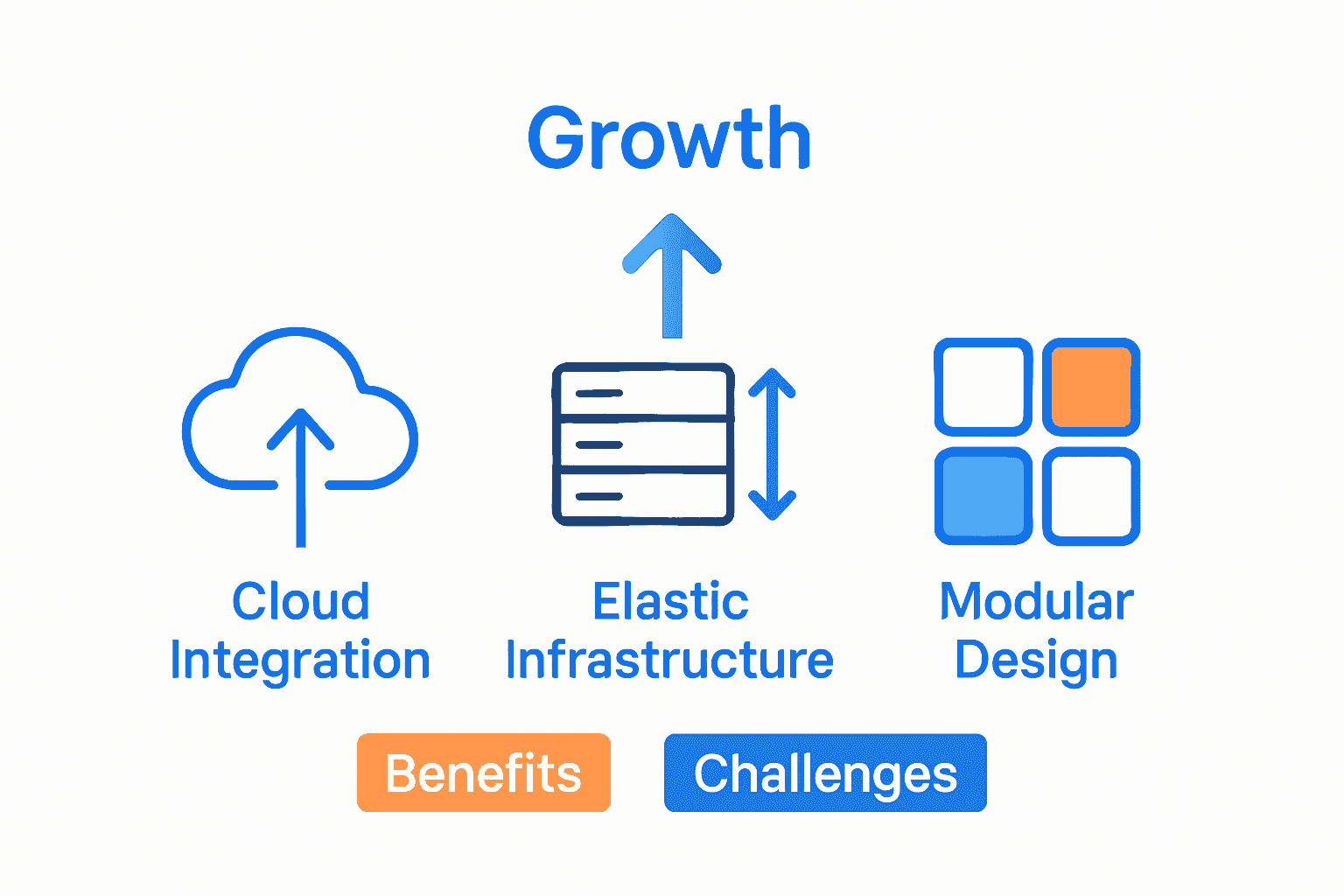Over 60 percent of south-african businesses report that scaling their ecommerce platforms is one of their greatest digital challenges. As online markets grow more crowded, finding the right technology can make the difference between rapid expansion and missed opportunities. This guide will help you understand the key features, benefits, and common pitfalls of scalable ecommerce solutions so you can confidently plan for long-term business growth.
Table of Contents
- Defining Scalable Ecommerce Solutions
- Types of Ecommerce Platforms Explained
- Essential Features for Scalability
- Cloud Integration and Flexibility Benefits
- Costs, Challenges, and Common Pitfalls
Key Takeaways
| Point | Details |
|---|---|
| Scalability is Essential | Ecommerce solutions must have an elastic infrastructure to adapt to customer demand and growth without sacrificing performance. |
| Decentralised Technologies Enhance Flexibility | Implementing blockchain and smart contracts can create resilient digital ecosystems that cater to changing market needs. |
| Choose the Right Platform Wisely | Assess your business requirements, growth potential, and technical infrastructure before selecting an ecommerce platform. |
| Be Aware of Hidden Costs | Understand the total cost of ownership beyond initial implementation, including maintenance and security expenses. |
Defining Scalable Ecommerce Solutions
Scalable ecommerce solutions are sophisticated digital platforms that enable online businesses to grow seamlessly, adapting to increasing customer demand without compromising performance or user experience. At its core, a scalable solution provides flexible infrastructure that can expand computing resources, handle higher traffic volumes, and support business growth dynamically.
According to research from arxiv.org, modern scalable ecommerce platforms are increasingly leveraging advanced technologies like blockchain to create more robust, decentralised architectures. These innovative solutions enable direct customer-seller interactions while maintaining system integrity and performance under varying computational demands.
Key characteristics of scalable ecommerce solutions include:
- Elastic infrastructure that can rapidly adjust computational resources
- Modular architecture allowing independent component scaling
- Cloud-based deployment enabling quick resource allocation
- Automated load balancing mechanisms
- Seamless integration with existing business systems
Moreover, arxiv.org highlights that emerging decentralised technologies are revolutionising how businesses approach scalability.
 By implementing smart contract protocols and distributed computing models, organisations can create more resilient, flexible digital commerce ecosystems that adapt to changing market requirements with unprecedented efficiency.
By implementing smart contract protocols and distributed computing models, organisations can create more resilient, flexible digital commerce ecosystems that adapt to changing market requirements with unprecedented efficiency.
Choosing the right scalable ecommerce solution requires careful evaluation of your specific business needs, anticipated growth trajectories, and technical infrastructure. For a deeper understanding of launching a robust online platform, see our tutorial on launching an ecommerce site.
Types of Ecommerce Platforms Explained
Ecommerce platforms represent critical technological infrastructures that enable businesses to establish, manage, and grow their online sales channels. According to Coursera, these platforms vary significantly in complexity, features, and suitability for different business models and sizes.
Self-Hosted Platforms provide complete control and customisation, allowing businesses to build unique digital storefronts. These platforms require technical expertise but offer maximum flexibility. Wikipedia highlights that self-hosted solutions typically involve installing software on your own servers, giving organisations complete ownership of their digital commerce environment.
The primary types of ecommerce platforms include:
- Hosted Platforms: Managed solutions with built-in features and simplified setup
- Open-Source Platforms: Customisable systems with extensive development potential
- SaaS (Software as a Service) Platforms: Cloud-based solutions with subscription models
- Marketplace Platforms: Third-party selling environments like Amazon or Takealot
- Social Commerce Platforms: Integrated selling through social media channels
Choosing the right platform depends on multiple factors such as technical capability, budget, scalability requirements, and specific business goals.
For deeper insights into creating a successful online presence, explore our guide on understanding automation in ecommerce, which provides additional context for selecting the most appropriate digital commerce solution.
Essential Features for Scalability
Scalability in ecommerce platforms is not just a technical requirement but a strategic imperative for businesses aiming to grow and adapt in a dynamic digital marketplace. According to cutting-edge research from arxiv.org, advanced machine learning techniques are revolutionising how businesses manage large-scale digital catalogues and ensure system performance under increasing computational demands.
Architectural Scalability represents the foundational aspect of a robust ecommerce platform. This involves designing systems that can effortlessly expand computing resources, handle increased user traffic, and integrate new functionalities without disrupting existing operations. arxiv.org highlights the importance of adaptive architectures that can dynamically generate and manage complex order processing systems.
Key scalability features include:
- Elastic Infrastructure: Ability to automatically scale resources up or down
- Modular Design: Separate components that can be independently upgraded
- Cloud-Native Architecture: Leveraging distributed computing environments
- Advanced Caching Mechanisms: Reducing server load and improving response times
- Automated Load Balancing: Distributing computational workloads efficiently
Businesses seeking comprehensive insights into building scalable digital solutions can explore our detailed guide on scalable software solutions, which provides in-depth strategies for creating robust, future-proof technological ecosystems that can adapt to evolving market requirements.
Cloud Integration and Flexibility Benefits
Cloud integration represents a transformative approach for ecommerce platforms, enabling businesses to achieve unprecedented levels of operational agility and technological responsiveness. Wikipedia highlights the emergence of headless commerce architectures, which fundamentally decouple front-end presentation layers from back-end infrastructure, providing businesses with extraordinary flexibility in digital experience design and deployment.
The core advantage of cloud-integrated systems lies in their ability to adapt dynamically to changing business requirements. As Wikipedia demonstrates through open-source solutions, modular design principles allow organisations to create highly customisable technological ecosystems that can evolve without massive restructuring or significant capital investment.
Key benefits of cloud integration include:
- Rapid Scalability: Instantly adjust computational resources
- Cost Efficiency: Pay only for resources actively used
- Global Accessibility: Seamless operations across different geographical regions
- Enhanced Security: Centralised management of data protection protocols
- Continuous Innovation: Simplified technology upgrades and feature implementations
Businesses looking to deeply understand technological integration strategies can explore our comprehensive guide on enterprise app integration, which provides nuanced insights into creating robust, interconnected digital infrastructures that drive competitive advantage.

Costs, Challenges, and Common Pitfalls
Navigating the complex landscape of ecommerce platform selection involves understanding the multifaceted financial and operational challenges that businesses encounter. According to research from ERIC, organisations frequently underestimate the total cost of ownership for digital commerce solutions, which extends far beyond initial implementation expenses.
Hidden Costs represent a significant challenge for businesses investing in ecommerce platforms. ACS emphasises that companies must account for both direct and indirect expenses, including infrastructure maintenance, ongoing development, security upgrades, and potential integration complexities that can substantially impact overall budgetary considerations.
Common pitfalls in ecommerce platform selection include:
- Inadequate Scalability Planning: Choosing platforms with limited growth potential
- Poor Integration Capabilities: Difficulty connecting with existing business systems
- Underestimated Maintenance Costs: Ongoing technical support and upgrade expenses
- Security Vulnerabilities: Insufficient protection against digital threats
- Limited Customisation Options: Rigid platforms restricting business-specific requirements
Businesses seeking to mitigate these challenges can benefit from our comprehensive guide on API integration, which provides strategic insights into creating robust, flexible digital infrastructure that minimises potential implementation risks.
Unlock Seamless Growth with Scalable Ecommerce Solutions
Scaling your online business requires more than just adding features. The article highlights challenges such as elastic infrastructure, modular design, and cloud-based flexibility as essential for coping with rising demand and maintaining performance. You might be facing pain points like inadequate scalability planning, costly maintenance, or poor integration—all of which can restrict your ecommerce growth.
At Cloudfusion, we specialise in crafting custom, scalable ecommerce platforms tailored to your unique business needs. Our solutions combine modular architectures, cloud integration, and automated load balancing so your online store performs reliably even as your traffic surges. Don’t let hidden costs and technical complexity hold you back.
Discover how we can help you build a robust digital presence with our web design and development services. Take the first step towards a future-proof ecommerce platform that grows effortlessly with your business. Reach out today at cloudfusion.co.za and start transforming your online operations now.
Frequently Asked Questions
What are scalable ecommerce solutions?
Scalable ecommerce solutions are digital platforms designed to help online businesses grow without sacrificing performance. They offer flexible infrastructure to adapt to increased customer demand while maintaining user experience.
What are the key features of scalable ecommerce platforms?
Key features include elastic infrastructure, modular design, cloud-based deployment, automated load balancing, and seamless integration with existing systems to support dynamic business growth.
How does cloud integration benefit ecommerce scalability?
Cloud integration allows businesses to rapidly scale resources, reduce costs, enhance security, and enable global accessibility. It also facilitates continuous innovation, making it easier to implement new features and updates.
What challenges should businesses anticipate when choosing an ecommerce platform?
Businesses may face hidden costs, inadequate scalability planning, poor integration capabilities, security vulnerabilities, and limited customisation options. Understanding these challenges can help in selecting the right ecommerce platform.








